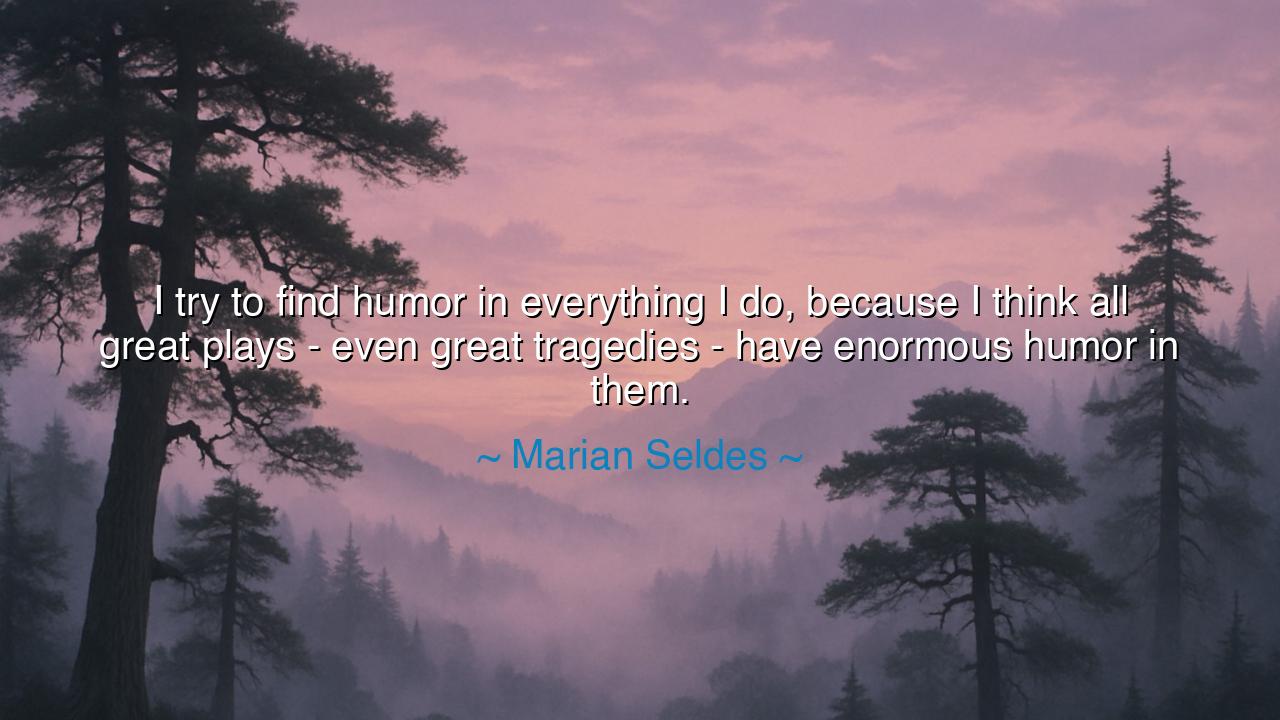
I try to find humor in everything I do, because I think all great
I try to find humor in everything I do, because I think all great plays - even great tragedies - have enormous humor in them.






In the words of Marian Seldes, “I try to find humor in everything I do, because I think all great plays — even great tragedies — have enormous humor in them.”
Within this simple truth lies a revelation about the nature of life and art — that humor is not the enemy of sorrow, but its twin. Seldes, a woman of the stage whose voice once carried the weight of Shakespeare and the wit of Wilde, speaks from the heart of performance and the soul of humanity. Her words remind us that even amid tragedy, laughter survives — fragile, perhaps, yet unbreakable. For in the theater of existence, as upon the stage, humor is not a distraction from truth, but the very way by which truth becomes bearable.
The origin of this idea reaches back to the dawn of storytelling itself. The Greeks, those first masters of drama, never separated tragedy from comedy as cleanly as we imagine. Their greatest playwrights, Sophocles and Euripides, understood that the human heart cannot live on grief alone. In their darkest scenes, irony flickered — a cruel jest of fate, a wry acknowledgment of life’s absurdity. This balance between laughter and lament was not contradiction, but completeness. For the ancients knew: to weep without ever laughing is to lose one’s humanity, and to laugh without ever weeping is to lose one’s soul.
When Seldes declares that even the great tragedies have enormous humor, she speaks to the deep paradox that defines existence — that sorrow and joy are woven together in the same cloth. The actor who performs King Lear must not only taste despair but also glimpse the strange comedy of human blindness; the audience who watches Oedipus Rex must feel not only horror, but awe at the cosmic irony of fate. Humor in tragedy does not mock the pain — it reveals the humility beneath it. It shows us that even in ruin, life is still alive, still absurdly human, still capable of smiling through tears.
Consider the example of Abraham Lincoln, whose heart carried the burdens of civil war. He was a man haunted by loss, yet those who knew him spoke of his humor — gentle, self-effacing, and wise. When asked how he endured the crushing sorrow of his time, he said, “If I did not laugh, I should die.” Like the heroes of ancient tragedy, Lincoln understood what Seldes teaches: that laughter is not denial, but resilience. It is the breath that keeps the flame of courage alive in the midst of darkness.
On the stage, Marian Seldes brought this wisdom to life. She believed that an actor’s task was not merely to perform emotion, but to reveal the full spectrum of humanity — its dignity, its folly, its contradictions. In tragedy, she sought humor, for it is the thread that binds the audience to the character. Laughter is recognition; it bridges the gulf between the watcher and the sufferer. When the audience laughs in the midst of sorrow, they do not trivialize the pain — they share it. They see themselves reflected in it, and in that moment of shared laughter, the story becomes universal.
There is a secret strength in those who can find humor within hardship. They are the ones who understand that the world is not divided between joy and sorrow, but that both flow from the same river. The humor Seldes speaks of is not the laughter of mockery, but of wisdom — the soft smile that comes from seeing clearly. It is the understanding that life is magnificent and tragic all at once, and that only by embracing both can we truly live. Such humor does not remove pain, but redeems it. It turns tragedy into truth, and truth into grace.
Let this be the lesson of her words: seek humor in all things, even in sorrow, for it is the sign of a heart still open to life. When the world darkens, do not surrender to bitterness; instead, find the small, flickering light of laughter. Laugh not to escape, but to endure. See in every tragedy the hidden smile of understanding, and in every comedy the echo of sorrow. To live fully is to balance both, as Seldes did — to perform the play of life with all its contradictions, finding beauty not in perfection, but in truth.
And so, dear listener, remember: when grief weighs heavy upon you, do not silence your laughter; when joy fills your heart, do not forget your tears. For as Marian Seldes teaches, the greatest stories — and the greatest lives — are those that contain both. To find humor in the midst of tragedy is not to mock life, but to honor it. For laughter, when born from understanding, is the soul’s most eloquent act of faith — a quiet declaration that even in the face of sorrow, we are still alive, still human, and still capable of light.






AAdministratorAdministrator
Welcome, honored guests. Please leave a comment, we will respond soon